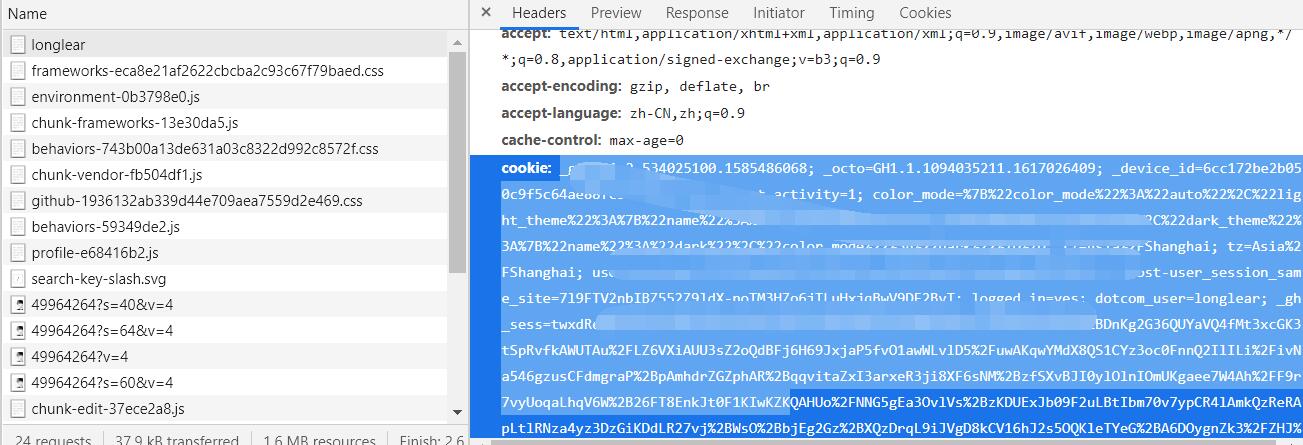scrapy實現登錄有兩種思路:
1. 直接攜帶cookie登錄;
應用場景:
(1)cookie過期時間很長,常見于一些不規范的網站
(2)能在cookie過期之前把所有的數據拿到
(3)配合其他程序使用,比如其使用selenium把登陸之后的cookie獲取到保存到本地,scrapy發送請求之前先讀取本地cookie
<br/>
2. 找到登錄的url,發送post請求存儲cookie;
例:登錄github
<br/>
**1. 直接攜帶cookie登錄**
(1)創建爬蟲項目
```shell
> scrapy startproject git
> cd git
> scrapy genspider git1 github.com
```
<br/>
(2)配置`settings.py`
```python
# Crawl responsibly by identifying yourself (and your website) on the user-agent
USER_AGENT = 'Mozilla/5.0 (Windows NT 10.0; Win64; x64) AppleWebKit/537.36 (KHTML, like Gecko) Chrome/89.0.4389.90 Safari/537.36'
# Obey robots.txt rules
ROBOTSTXT_OBEY = False
```
<br/>
(3)先手動登錄到github,復制cookie

<br/>
(4)重寫 `start_requests` 方法
```python
import scrapy
class Git1Spider(scrapy.Spider):
name = 'git1'
allowed_domains = ['github.com']
# 注意:請求的url應該是 https://github.com/你的github用戶名
start_urls = ['https://github.com/你的github用戶名']
def parse(self, response):
# 登錄前github上的title是 GitHub . GitHub
# 登錄成功后為 用戶名 . GitHub
# 輸出 用戶名 · GitHub,說明登錄成功
print(response.xpath('/html/head/title/text()').extract_first()))
pass
def start_requests(self):
"""
重寫該方法
"""
url = self.start_urls[0]
cookie = '_ga=GA1.2.534025100(cookie太長了這里省略不寫了)...3D'
# 1. 將cookie轉換為字典
cookies = {data.split('=')[0]: data.split('=')[-1] for data in cookie.split(';')}
# 2. 攜帶cookies發送請求
yield scrapy.Request(
url=url,
callback=self.parse,
cookies=cookies
)
```
<br/>
**2. 找到的url,攜帶相關參數發送post請求**
其分析過程這里就省略了,下面只提供了scrapy中用于發送 POST 請求的代碼。
```python
import scrapy
class Git2Spider(scrapy.Spider):
name = 'git2'
allowed_domains = ['github.com']
start_urls = ['http://github.com/login']
def parse(self, response):
# 1. 解析出登錄需要的所有參數
post_data = {}
# 2. 找到登錄的url,提交請求
# 發送 POST請求可以調用scrapy.FormRequest
# 或者 scrapy.Request(url, method='POST')
yield scrapy.FormRequest(
url='https://github.com/session', # github提交表單的地址
callback=self.login_github, # 登錄成功后的解析函數
formdata=post_data # 進行登錄時所需要的參數
)
pass
```
- 爬蟲基本概念
- 爬蟲介紹
- 通用爬蟲與聚焦爬蟲
- 通用爬蟲
- 聚焦爬蟲
- HTTP與HTTPS協議
- HTTP協議簡介
- HTTP的請求與響應
- 客戶端HTTP請求
- 服務端HTTP響應
- requests庫
- requests庫簡介
- requests簡單使用
- 發送帶header的請求
- 發送帶參數的請求
- 案例:下載百度貼吧頁面
- 發送POST請求
- 使用代理
- 為什么要使用代理?
- 正反向代理
- 代理服務器分類
- 使用代理
- cookie和session
- cookie和session的區別
- 爬蟲處理cookie和session
- 使用session登錄網站
- 使用cookie登錄網站
- cookiejar
- 超時和重試
- verify參數忽略CA證書
- URL地址的解碼和編碼
- 數據處理
- json數據處理
- json數據處理方案
- json模塊處理json數據
- jsonpath處理json數據
- 正則表達式
- lxml
- xpath與lxml介紹
- xpathhelper插件
- 案例
- Beautiful Soup
- Beautiful Soup介紹
- 解析器
- CSS選擇器
- 案例
- 四大對象
- 爬蟲與反爬蟲
- 爬蟲與反爬蟲的斗爭
- 服務器反爬的原因
- 什么樣的爬蟲會被反爬
- 反爬領域常見概念
- 反爬的三個方向
- 基于身份識別進行反爬
- 基于爬蟲行為進行反爬
- 基于數據加密進行反爬
- js解析
- chrome瀏覽器使用
- 定位js
- 設置斷點
- js2py
- hashlib
- 有道翻譯案例
- 動態爬取HTML
- 動態HTML
- 獲取Ajax數據的方式
- selenium+driver
- driver定位
- 表單元素操作
- 行為鏈
- cookie操作
- 頁面等待
- 多窗口與頁面切換
- 配置對象
- 拉勾網案例
- 圖片驗證碼識別
- 圖形驗證碼識別技術簡介
- Tesseract
- pytesseract處理圖形驗證碼
- 打碼平臺
- 登錄打碼平臺
- 驗證碼種類
- 多任務-線程
- 繼承Thread創建線程
- 查看線程數量
- 資源共享
- 互斥鎖
- 死鎖
- 避免死鎖
- Queue線程
- 多線程爬蟲
- 多任務-進程
- 創建進程
- 進程池
- 進程間的通信
- Python GIL
- scrapy框架
- scrapy是什么?
- scrapy爬蟲流程
- 創建scrapy項目
- Selector選擇器
- logging
- scrapy shell
- 保存數據
- Item數據建模
- 翻頁請求
- Request
- CrawlSpider
- settings
- 模擬登錄
- 保存文件
- 內置Pipeline
- 自定義Pipeline
- 中間件
- selenium動態加載
- 防止反爬
- 隨機User-Agent
- 隨機IP代理
- settings中的參數
- 隨機延遲
- request.meta常用參數
- 分布式爬蟲
- 分布式原理
- scrapy_redis
- 去重問題
- 分布式爬蟲編寫流程
- CrawSpider改寫成分布式
- scrapy_splash
- scrapy_splash是什么?
- scrapy_splash環境搭建
- APP抓取
- Android模擬器
- appium
- appium是什么?
- appium環境搭建
- appium環境聯調測試
- appium的使用
- 演示項目-抓取抖音app
- 抖音app與appium的聯調測試
- 元素定位
- 抖音appium代碼
- 抓包軟件
- url去重處理
